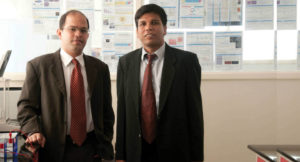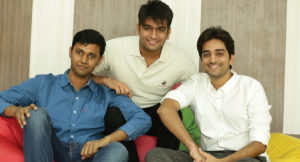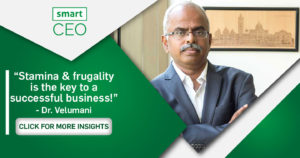In 15 years, Ameera Shah transformed Metropolis Healthcare from a single lab in Mumbai to a chain of 135 laboratories raking in revenues of Rs. 650 crores in FY 2015. She’s now gearing up for the next phase of growth, one in which she wants to create a formidable diagnostics brand in two geographies – India and Africa. Her master goal: reach a valuation of Rs. 12,000 crores by 2020.

Every entrepreneur’s journey, when retold with the benefit of hindsight, can throw up valuable lessons on several aspects of managing a business. However, many such stories, often, tend to simplify the hardship that is entrepreneurship. The journey is often seen as a set of events that shaped up the venture to what it is today; but, in reality, it is much more complex than that. There are several unexplained events, day-to-day challenges that often get left out in such narratives and most importantly, the role played by team members in executing a strategy is often overlooked.
Having said that, when an entrepreneur looks back at his or her own journey and asks the question “what could I have done better?” it gives a whole new perspective to the narrative. One such story that we’d like to share here is that of a woman entrepreneur who was told by her father that whatever she becomes, she has to be the absolute best at it.
This is the journey of Ameera Shah, the woman leader of Metropolis Healthcare, the diagnostics company, who built her organisation block by block and led it to become an organisation with revenue of Rs. 650 crores spread across 7 countries. When Ameera joined her father’s business, Dr. Sushil Shah’s laboratory, in 2001, it was an 1800 square feet single laboratory in Gamdevi, Mumbai. Subsequently, in the same year, the laboratory was renamed to Metropolis and today, has grown to become a 135 laboratory chain not just popular in India but also in Srilanka, UAE, South Africa, Kenya and Ghana. Metropolis has expanded its tentacles in the last 15 years and grown to become an organisation with over 3500 employees, 135 laboratories, 1000 collection centres and has created a seamless network across India.
But all this has not come easy. Ameera admits that her best learning has come from a careful analysis of her own journey, and she aims to put it to use as she gears up for her next phase, what she calls Metropolis 2.0.
We requested Ameera to take us through her 15-year journey, by splitting it into three phases. We wanted her to analyse her own decisions (or sometimes, the lack of them), approach to growth, marketing strategies adopted and the key lessons she learnt during these different phases.
Looking forward, she says, “In the next 5 years, we will be more focused and aggressive and strengthen the brand in the diagnostics segment.” She aims to look for opportunities that can potentially disrupt the industry and achieve the organisation’s vision of creating tremendous value for its shareholders.

Phase one: 2001 to 2005
It was all about establishing the business
A finance and business management graduate from the University of Texas, Austin, Shah realised early on in her career that a standard corporate career wasn’t for her. She saw the potential in her father, Dr. Sushil Shah’s diagnostic lab in Mumbai. She set herself the goal to build a pan-India brand in the diagnostics space. The reasoning was simple: “The industry was very fragmented with more than two lakh small pathology labs across India and most of them had no minimum standards,” recalls Ameera.
However, to understand the nuances of the industry, she had to get into the nitty-gritty of the business and, hence, she donned many hats – that of a customer facing executive, studying new markets for expansion, hiring and building a team and getting into the administrative side of the organisation. While doing this, she also retained her steadfast focus on establishing standard operating procedures, to ensure quality and consistent service across centers.
What immediately differentiated Metropolis from rest of the pack was its technical expertise and research, which became evident with the number of tests it offered. In 2002, it offered 500 varieties of tests while other pathology labs had 200. And this number increased to 1500 varieties of tests in 2005. “In fact, many hospitals started to outsource tests to us,” recalls Ameera, mentioning a key source of customer acquisition.
However, Ameera recognised the fact that Metropolis’ popularity was restricted to Mumbai. She had to don her creative hat, to figure out a unique game plan to scale up across the country. The obvious approach would have been to expand the brand one city at a time. But Ameera adopted a completely different approach. She wanted to enter new markets through the acquisition of well-known, respected diagnostic labs. However, this wouldn’t be a big bang acquisition of a large number of centers; rather, it would be a small acquisition, which would then be used as the base to scale up.
Between 2003 and 2005, Metropolis started to forge alliances with well-known local brands that had a strong backend. Some of the early partnerships were with Sudharma in Kerala, Lister in Chennai and Desai Laboratories in Surat. But this was not as easy task, as she found it hard to convince laboratories to forge partnerships during the early days. But her father’s expertise helped her overcome this and eventually, Metropolis went from being a single laboratory organisation to run over 10 labs with 150 collection centers by 2005.
In 2005, we also expanded to Sri Lanka through a joint venture, thus setting up the agenda for expansion outside India,” says Ameera.
![]()
Setting the right tone
To make all this happen, the organisation needed to formulate a set of clear strategies:
One, Metropolis started acquiring laboratories for expanding its tentacles outside Mumbai while within the city it set up its own centres.
Two, the company started hiring people with a non-technical profile for purchase, customer care, marketing and other functions that it did not focus on earlier.
Three, the organisation felt the need to get accredited globally, to enhance the credibility of the brand. In 2004, it got its first accreditation from the National Accreditation Board of Testing and Calibration Laboratories, while in 2005 it got accredited by College of American Pathologists, an internationally recognized program and a unique one that utilizes teams of practicing laboratory professionals as inspectors.
Four, it also started increasing its technical processing ability and came up with new tests to help make it a serious, pan-India player.
At the end of this phase, the company was valued at approximately Rs. 135 crore with a revenue of Rs. 40 crore (from Rs. 15 crore in 2001).
Phase Two: 2006-2010
Global foray and alliances
Continuing its ascent, Metropolis started implementing a unique strategy of simultaneously growing in both domestic and global markets. “There was no specific strategy to foray globally but when an opportunity came up, we decided to go with it,” states Ameera. The company was the first multinational in its sector and has over 10 years’ experience now in dealing with the vagaries of international markets. Its first international alliance was with the Navloka Group in Sri Lanka where it currently has about 50 labs and 200 centres. Realising the opportunity that emerging markets offered, the company also entered Dubai and South Africa very early in its lifecycle, while continuing to acquire labs in cities like Pune, Kerala and Gujarat.
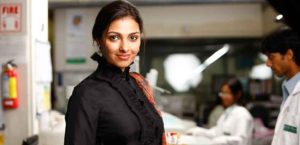
Restructuring the organisation
And all this growth did not miss the sharp eyes of an investor and in 2006, the company received its first round of institutional investment from ICICI Ventures, which invested about Rs. 35 crore for a minority stake. Eventually, in 2010, ICICI Ventures exited Metropolis with about 4x returns and at the same time Warburg Pincus came on board as an investor.
However, as Metropolis had a disorganised structure with no clear leader then, it was obstructing its growth. Ameera and three others were working together since 2001 on building the organisation. “There were too many promoters and that was the biggest issue at the time,” states she. And hence, when ICICI Ventures exited its investment in 2010, Metropolis reorganised its board and Ameera became the Managing Director of the organisation, while everyone else became non-executive directors. “This helped us become much more aggressive between 2011 and 2015. We were able to scale up aggressively, lead from the front, improve our talent pool and set up key processes and systems in place,” explains Ameera.
While all this was happening on the organisation front, Ameera started observing that her customers were getting more affluent, well-travelled and as a result their expectations were changing. “They expected to have the right ambience and not just something that was basic and practical. With increase in road traffic, people didn’t want to travel much and hence, convenience started mattering a lot,” explains Ameera. While Metropolis was used to offering home collection services, it decided to expand and organize this service in 2006, with the idea of making it a key differentiator.
While growth was happening on one end, the organisation started to make investments on the backend as well. Ameera says, “In hindsight, I feel we should have focused a lot more on systems and processes during this phase, but we were short of management bandwidth.” Despite this, the company did well on revenue growth, touching Rs. 220 crore in 2010 (from Rs. 40 crore in 2005).
In 2010, the company operated 30 labs, over 400 collection centres and offered 3500 varieties of tests
“We should have built our back end and integrated all our labs completely. Instead, Metropolis continued to grow not only India but also in global markets, but our backend was lagging behind. This has taught me that all the phases should come in the right order.”
Phase three – 2011 – 2015
Scaling the business
“An exciting and a productive period,” says Ameera, about the last five years. It started with building a robust backend. This gained paramount importance as there were many individual labs entering its stable and they had to start thinking like a group and relate to the brand called Metropolis. “To make them come around with our best practices was a challenge but it was core to brand,” she says.
The organisation also started integrating all the labs, creating a common platform for finance, IT, HR, stores and material handling. “This was particularly important as our business is a distributive business with centres all around the country and integrating them and putting in the right controls was essential,” says Ameera, emphasizing on its importance. Given the increase in the number of acquisitions, the company also had to work on integrating people’s mindset and culture.
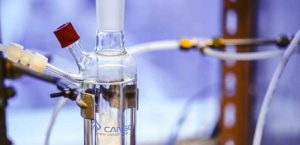
Building density
While the company acquired labs in India and outside, it realised that it didn’t have density in the market. “For example, we didn’t have too many centres in Mumbai. It was important for us to start dominating some markets and build density in those markets rather than being across too many countries,” shares Ameera.
With respect to its global strategy, the company took a firm decision to stay focused only on Africa, going forward. While Metropolis will be open to exploring opportunities, it has decided not to add too many geographies. “For now, we have decided to focus only on Africa as it has the opportunity of panning out just like it did in the Indian market,” shares Ameera.
From no marketing in 2001-05, the company gradually built its marketing strategy and had a clear framework by the second half of 2011-15. “For the first three years, marketing was very minimal, while in the last two years we stepped up our spend, especially on building Metropolis into a strong consumer brand,” shares Ameera. The company has so far spent about Rs. 4 crore to Rs. 5 crore on marketing and aims to double this number going forward.
On the organisational structure front, one of the most important changes that took place was when Warburg Pincus exited its whole 27 per cent investment in April 2015. The promoter family bought back this stake with financial support from KKR, the global private equity major, and other industrialists. “I orchestrated an exit for Warburg, where I bought their share out myself in March 2015. One of the other financial investors, Dr. Velu, also exited in September 2015 (He was investor from 2001),” shares Ameera. This was important for creating a clean shareholding structure. “Today, I am extremely proud to say that we have an aligned and a fully actualized board who can deliver solid strategic counsel and direction,” shares she.
Making the natural progress
During each phase, the expectation of the consumer grew with time and the 2011-15 timeframe was no different. The consumer became health conscious and people started managing their well-being more proactively. “We’re certainly seeing a significant growth in revenues from regular health checkups. These are people who keep tabs on key parameters, even without a doctor’s prescription,” says Ameera.
In this phase, Metropolis grew at a CAGR of 25 per cent (while the industry growth rate was between 12 and 15 per cent), touching revenues of Rs. 650 crore in FY 2015. It currently employs 3500 people and operates 135 labs and 1000 centres in 7 countries.
In 2015, Warburg exited Metropolis and the biggest decision that I took was to buy back the stake and increase the promoters’ stake to a majority. This was important for the business and the way it would function going forward. Today, I am proud that we have a clean ownership and board structure.
![]()
Phase four – 2016 to 2020
Metropolis 2.0
Ameera believes that there are three key foundations – an established network of centres, strong backend, and a well-aligned board structure – that’ll augur well as she gears up for the next phase of Metropolis.
“I am looking at the future from a progressive perspective, rather than having a retrospective view,” she says. The previous phase was a mix of growth and clean up, but the next one, she believes, will be a lot more focused.
“We will take a concentrated and aggressive stance. We are also evolving to bring in more professionals. Recently, we appointed a CEO and rejigged our senior management structure. Of course, the role of the promoter will continue to be crucial,” she explains.
Ameera says, “While many opportunities come up, learning to say no is crucial. The opportunities you go after must align with the overall goals of the organization.” Like most consumer-facing businesses, Metropolis aims to strengthen its understanding of customers and stay nimble enough to grab opportunities as they come up. Another of Ameera’s key priorities today is to nurture her people, retain, grow and incentivize the team across the board.
Going forward
A key strategy for the next phase is to build regional dominance and not fragmented dominance. For Metropolis, its Western and Southern regions are strong markets and the team aims to build dominance in these geographies while its Northern and Eastern markets are very opportune areas that it aims to go aggressive on in the coming years.
Internationally, Metropolis aims to focus on the African market and in the next five years it aims to touch Rs. 100 crore in top line from that region.
Metropolis’ goal for 2020 is very clear: from its current valuation of approximately Rs. 4000 crores, Ameera hopes to reach a valuation of Rs. 12,000 crores to Rs. 15,000 crores within the next five years. As we draw this conversation to a close, Ameera says, “Valuation encapsulates many things – profit, balance sheet, quality and defensibility of business and what the market thinks about your brand. Our strategy is to deliver on all these fronts.”

Implementation tips
Each Sample is a Life – Quality is paramount in healthcare but it has been the most overlooked factor in pathology industry as there is neither standardisation nor basic requisite to set up a laboratory. And to ensure this in his organisation, Dr Sushil Shah said, “Treat each sample as if it was your mother’s’’. The company is present in 450 cities and towns and found it a huge challenge to actually implement a standard operating procedure. Today, it has a rigorous 149-step process and a 3-step verification policy before a report is given out.
“Do not compromise on the quality of your service”
Dare to follow your own path – Metropolis first expanded to Sri Lanka when it realised that samples were being sent to Singapore for analysis as it was in a position to offer better price at the same quality. Likewise, samples from the Middle East were being sent to Europe. When it looked at Africa for expansion; industry leaders, veterans and mentors discouraged them from doing so as they felt that it was a risky market. But, its expansion was a result of intense ground research, market study, consumer behaviour study, pricing and analysis of local laws and regulations. Today, it has about 15 labs and 75 collection centres in Africa (South Africa, Kenya, Mauritius, Ghana, and Zambia).
“Expanding to new market needs to be backed with thorough local market analysis”
Setting up a cloud based system
Today, more than 1000 Metropolis centres are on a cloud-based next generation Information Management system and this is going to be important to its growth going forward. This system ensures that each report and record is stored in a systemic format and is retrievable anytime. It also helps in warehousing and data mining.
“Investment in technology is inevitable”
Building a culture of Integrity, empathy and accuracy- Employees play a major role in the growth of an organisation which is essentially fuelled by the culture it fosters. More specifically in healthcare, the way you treat your employees is how your employees will treat your customer. Metropolis manages people across 7 countries, 450 cities and towns. Its employees come from varied cultures in India, Sri Lanka, Africa and the Middle East. An organisation needs to constantly communicate the core brand values to the team which then gets translated to all levels of the organisation.
“Build a culture that will keep your employees motivated”
High quality and standard customer experience – In India and in emerging markets like Sri Lanka, Middle East and South Africa, to be able to offer a uniform standard of care at all your centres can be a challenge. Single prick painless blood collection, same day report (for most of the tests), report consultation with an expert and guaranteed error free diagnosis are just some of the parameters of customer care. The customer experience is standardised across any Metropolis’ center.
“Accurate planning and execution is the key”
Ameera’s evolution as an entrepreneur in the last 15 years
2001 – 2005: Building the business, block by block
My role was ever changing as I had to build everything from scratch. One day, I was the customer facing executive and the next day I was out on the field to study a new market for expansion. There were days when I was restructuring the entire system. We had to hire and build a team that would support our expansion. The first three years, a lot of energy was channelled in to building the foundation. While the basic foundation was being laid, I was also on the lookout for expansion.
2006 – 2010: A deal maker and a strategist
This was a crucial period for Metropolis as investors started to notice us. I had to play two critical roles: that of a fund raiser and at a strategy level to fuel the expansion plans.
2011 – 2015: Leading from the front
Between 2011 and 2015; in addition to being a deal maker, I had to also deal with decisions at a board level and tackle shareholder issues. It was important for me to align the organisations goals. In 2015, Warburg exited Metropolis and the biggest decision that I took was to buy back the stake and increase the promoters’ stake to a majority. The decision-making will be faster with a single majority investor rather than multiple investors taking calls on expansion plans. Apart from this, I also have to play an important role of that of a mentor to my team and align the goals of my management team with the board.
On a lighter note
My typical day begins at 7:30AM. The first hour of the day is slightly relaxed. I play with my dogs for a while and clear up all emails. I read the papers and then take some calls. After breakfast, I am in office by 9:30 AM to 10AM and in office up to 07:00 PM to 07:30PM. Each day is a tight schedule with back to back meetings that include brainstorming sessions with the core team, business reviews and quarterly analysis. There are meetings with partners, shareholders and board members. Apart from this, I am also an active industry speaker and represent the Brand Metropolis as a speaker and panellist at many industry and government forums. As a mentor, I accept invitations from educational institutions and I deliver talks at IIT, IIM, Harvard, Columbia etc. I love the outdoors and play tennis or volleyball 3 times a week. I take time off to read and also meet friends once in a week or ten days.
My favourite Book… The book that has influenced me the most remains Atlas Shrugged byAyn Rand. Off the books that I have read recently, I enjoyed A Fine Balance by Rohinton Mistryand The Tibetan Book of Living and Dying by Sogyal Rinpoche
If not an entrepreneur, I would have become.. I would have certainly been working in areas of women empowerment that would create a social impact.
One childhood memory that has remained a lesson..When my Dad used to take long walks at our Lonavla Bungalow and give me tips that has been critical in shaping my line of thought. One of the memories that vividly stand out as a lesson is when he told me “Whether you are a barber or a doctor or anything that you become tomorrow, you have to be the absolute best in what you do. You should always strive for excellence ’’
The best advice ever received…The purpose of life is to discover who you are. One way to do this is to constantly observe how you react to all situations, comfortable and uncomfortable, thereby the need to constantly push boundaries.
Metropolis At A Glance
| Centres | Tests | Employees | Revenue (In Cr) | |
| At the beginning of 2001 | 1 Lab and 5 collection centres | 500 | 50 | 15 |
| FY 2005 | 10 Labs and > 150 collection centres | 1500 | 800 | 40 |
| FY 2010 | 30 Labs and > 400 collection centres | 3500 | 2000 | 220 |
| FY 2015 | 135 Labs and > 1000 collection Centres | 4500 | 3500 | 650 |



